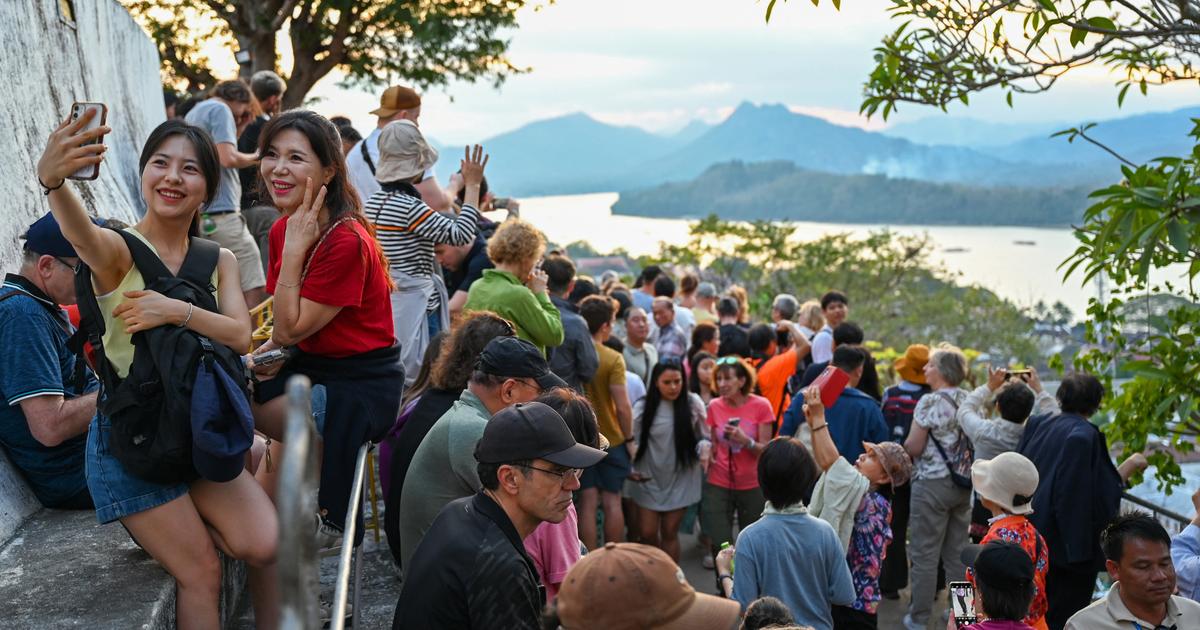In Luang Prabang, the tourist capital of Laos, the influx of visitors disrupts the tranquility of the city, where Buddhist monks, at first light each morning, beg for alms in increasingly crowded streets.
“There was no one in the street when we got up, and now it feels like a human tide
,” notes Shi Qii, a 30-year-old tourist from China.
Listed as a UNESCO World Heritage Site since 1995, Luang Prabang shines with its richly decorated pagodas, which bear witness to its past as a former royal capital.
The historic city, which has fewer than 25,000 inhabitants, attracted around 800,000 visitors in the first nine months of 2023, according to the latest data released by the state news agency.
The province of Luang Prabang is counting on three million tourists in 2024, a large part of the 4.6 million visitors expected this year in the country, which hopes to generate $712 million in revenue, according to the official media.
Tourism, propelled by the recent development of high-speed trains, is one of the rare sources of foreign currency for an economy that has been moribund since the pandemic, against a backdrop of inflation and massive debt to China.
Complaints from residents
In Luang Prabang (Laos), tourists crowd the mountains at sunset.
TANG CHHIN SOTHY / AFP
But in Luang Prabang, the influx of curious people is accompanied by inconveniences which disrupt the serenity of the city sleeping in a meander of the Mekong.
Every morning, monks in saffron-colored robes walk the streets, barefoot, to collect alms from residents, a brightly colored painting that is the subject of thousands of photos every day.
Locals complain that the procession - typical of Buddhist countries in Southeast Asia - has become a photo op.
“They take photos rather than buy something”
to offer to the monks, laments a 30-year-old shopkeeper, who sells offering baskets containing sticky rice in particular, for 50,000 kips (2 euros).
But
“if there are not enough tourists, we lose money
,” admits the trader, who refused to give her name.
Speaking to foreign media is considered dangerous in the country, where communist power exercises near-total control over the press.
Near her, a young woman lectures tourists, asking them not to get too close to the monks.
Development of a high-speed line with China
The Laotian government has focused on the development of the high-speed line, which since 2021 has linked the capital Vientiane to the Chinese border, via Luang Prabang, in an attempt to open up this mountainous country deprived of access to the sea. The brand-new station new Luang Prabang is about a thirty-minute drive from the center.
It bears an inscription in Lao and Mandarin, a reminder that Beijing financed a large part of the six billion dollars that the construction of the line cost.
Now, it takes less than nine hours to reach the metropolis of Kunming, nearly 1,500 kilometers away, in southwest China, thanks to a daily direct.
A journey which in practice could only be made by plane before.
Zhang Ying, a 70-year-old tourist who had just arrived by train from Chongqing (southwest China), always wanted to visit the kingdom of the “Million Elephants”, one of Laos' nicknames.
“This country is a potential flagship destination, and will probably develop well in the future, particularly with Xi Jinping's New Silk Roads,”
she underlines, in an allusion to the vast infrastructure program launched by the Chinese leader.
Karaoke cruises on the Mekong
Cruise ships on the Mekong, once peaceful, have become “karaoke cruises,” locals complain.
TANG CHHIN SOTHY / AFP
Experts have praised the economic potential offered by this first railway line in Laos.
But they were also worried about the risks posed by the weight of this new debt on the country's modest economy.
Residents interviewed also noted that the income generated by the Chinese train was unequally distributed.
And peaceful boat rides on the Mekong at sunset have increasingly transformed into karaoke cruises.
“The style has changed
,” recognizes the owner of three boats.
“It destroyed the tranquility.”

